经典英译汉文章翻译赏析
- 格式:doc
- 大小:49.00 KB
- 文档页数:6
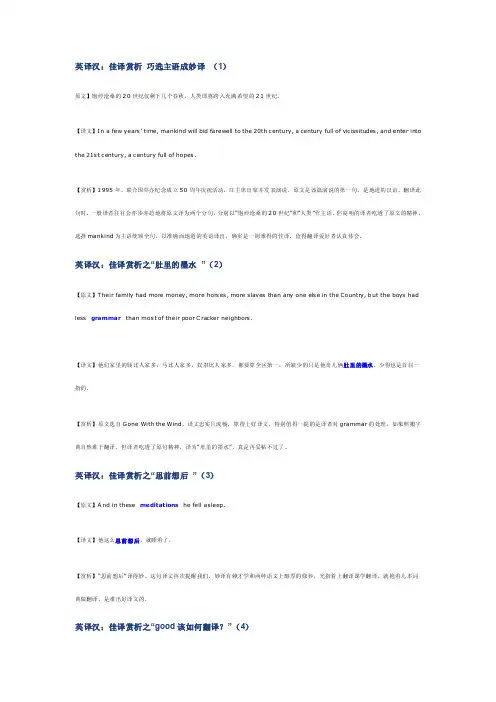
英译汉:佳译赏析巧选主语成妙译(1)原文】饱经沧桑的20世纪仅剩下几个春秋,人类即将跨入充满希望的21世纪。
【译文】I n a few years’ time, mankind will bid farewell to the 20th c entury, a century full of vic issitudes, and enter into the 21s t c entury, a c entury full of hopes.【赏析】1995年,联合国举办纪念成立50周年庆祝活动,江主席出席并发表演说。
原文是该篇演说的第一句,是地道的汉语。
翻译此句时,一般译者往往会亦步亦趋地将原文译为两个分句,分别以“饱经沧桑的20世纪”和“人类”作主语。
但高明的译者吃透了原文的精神,选择mankind为主语统领全句,以准确而地道的英语译出,确实是一则难得的佳译,值得翻译爱好者认真体会。
英译汉:佳译赏析之“肚里的墨水”(2)【原文】T heir family had more money, more hors es, more slaves than any one els e in the Country, b ut the boys had less grammar than mos t of their poor C racker neighbors.【译文】他们家里的钱比人家多,马比人家多,奴隶比人家多,都要算全区第一,所缺少的只是他哥儿俩肚里的墨水,少得也是首屈一指的。
【赏析】原文选自Gone With the Wind。
译文忠实且流畅,算得上好译文,特别值得一提的是译者对grammar的处理,如果照搬字典自然难于翻译,但译者吃透了原句精神,译为“肚里的墨水”,真是再妥帖不过了。
英译汉:佳译赏析之“思前想后”(3)【原文】A nd in these meditations he fell asleep.【译文】他这么思前想后,就睡着了。
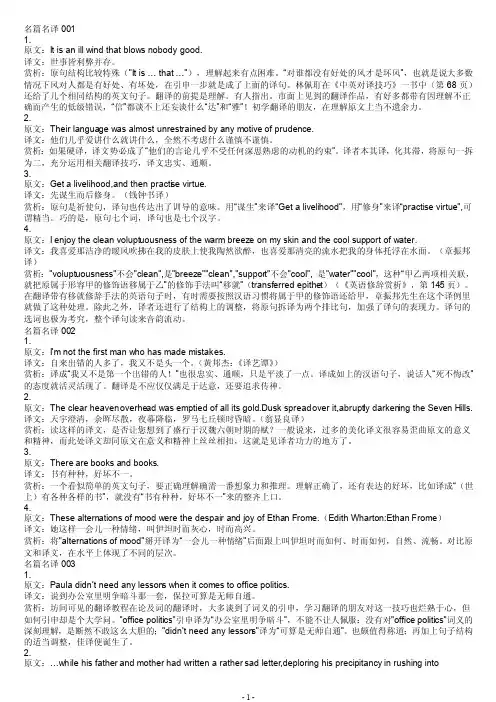
名篇名译0011.原文:It is an ill wind that blows nobodygood.译文:世事皆利弊并存。
赏析:原句结构比较特殊("Itis…that…"),理解起来有点困难。
“对谁都没有好处的风才是坏风”,也就是说大多数情况下风对人都是有好处、有坏处,在引申一步就是成了上面的译句。
林佩耵在《中英对译技巧》一书中(第68页)还给了几个相同结构的英文句子。
翻译的前提是理解。
有人指出。
市面上见到的翻译作品,有好多都带有因理解不正确而产生的低级错误,“信”都谈不上还妄谈什么“达”和“雅”!初学翻译的朋友,在理解原文上当不遗余力。
2.原文:Their languag e was almostunrestr ainedby any motiveof prudenc e.译文:他们几乎爱讲什么就讲什么,全然不考虑什么谨慎不谨慎。
赏析:如果硬译,译文势必成了“他们的言论几乎不受任何深思熟虑的动机的约束”。
译者本其译,化其滞,将原句一拆为二,充分运用相关翻译技巧,译文忠实、通顺。
3.原文:Get a livelih ood,and then practis e virtue.译文:先谋生而后修身。
(钱钟书译)赏析:原句是祈使句,译句也传达出了训导的意味。
用“谋生”来译“Getalivelih ood",用“修身”来译“practis e virtue",可谓精当。
巧的是,原句七个词,译句也是七个汉字。
4.原文:I enjoy the clean voluptu ousnes s of the warm breezeon my skin and the cool support of water.译文:我喜爱那洁净的暖风吹拂在我的皮肤上使我陶然欲醉,也喜爱那清亮的流水把我的身体托浮在水面。
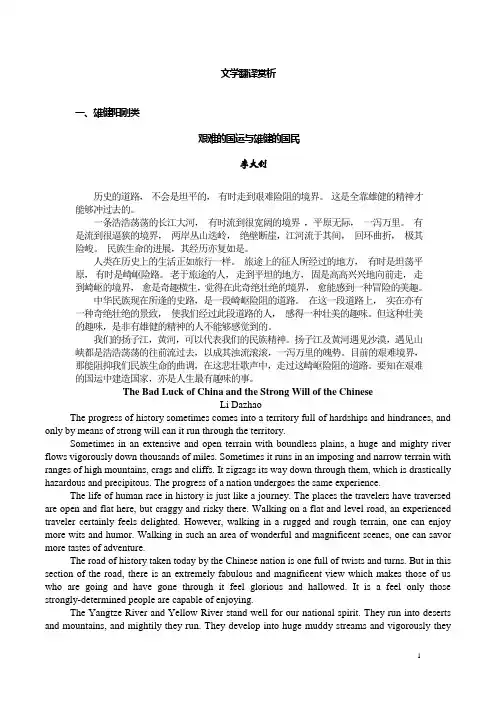
文学翻译赏析一、雄健阳刚类艰难的国运与雄健的国民李大钊历史的道路,不会是坦平的,有时走到艰难险阻的境界。
这是全靠雄健的精神才能够冲过去的。
一条浩浩荡荡的长江大河,有时流到很宽阔的境界,平原无际,一泻万里。
有是流到很逼狭的境界,两岸丛山迭岭,绝壁断崖,江河流于其间,回环曲折,极其险峻。
民族生命的进展,其经历亦复如是。
人类在历史上的生活正如旅行一样。
旅途上的征人所经过的地方,有时是坦荡平原,有时是崎岖险路。
老于旅途的人,走到平坦的地方,固是高高兴兴地向前走,走到崎岖的境界,愈是奇趣横生,觉得在此奇绝壮绝的境界,愈能感到一种冒险的美趣。
中华民族现在所逢的史路,是一段崎岖险阻的道路。
在这一段道路上,实在亦有一种奇绝壮绝的景致,使我们经过此段道路的人,感得一种壮美的趣味。
但这种壮美的趣味,是非有雄健的精神的人不能够感觉到的。
我们的扬子江,黄河,可以代表我们的民族精神。
扬子江及黄河遇见沙漠,遇见山峡都是浩浩荡荡的往前流过去,以成其浊流滚滚,一泻万里的魄势。
目前的艰难境界,那能阻抑我们民族生命的曲调,在这悲壮歌声中,走过这崎岖险阻的道路。
要知在艰难的国运中建造国家,亦是人生最有趣味的事。
The Bad Luck of China and the Strong Will of the ChineseLi DazhaoThe progress of history sometimes comes into a territory full of hardships and hindrances, and only by means of strong will can it run through the territory.Sometimes in an extensive and open terrain with boundless plains, a huge and mighty river flows vigorously down thousands of miles. Sometimes it runs in an imposing and narrow terrain with ranges of high mountains, crags and cliffs. It zigzags its way down through them, which is drastically hazardous and precipitous. The progress of a nation undergoes the same experience.The life of human race in history is just like a journey. The places the travelers have traversed are open and flat here, but craggy and risky there. Walking on a flat and level road, an experienced traveler certainly feels delighted. However, walking in a rugged and rough terrain, one can enjoy more wits and humor. Walking in such an area of wonderful and magnificent scenes, one can savor more tastes of adventure.The road of history taken today by the Chinese nation is one full of twists and turns. But in this section of the road, there is an extremely fabulous and magnificent view which makes those of us who are going and have gone through it feel glorious and hallowed. It is a feel only those strongly-determined people are capable of enjoying.The Yangtze River and Yellow River stand well for our national spirit. They run into deserts and mountains, and mightily they run. They develop into huge muddy streams and vigorously theydash and roar down thousands of miles. The current crisis can never stop our nation from advancing forward. Strongly determined, we should sing a march and, accompanied by this touching and tragic song.白杨礼赞矛盾……那就是白杨树,西北极普通的一种树,然而实在不是平凡的一种树。
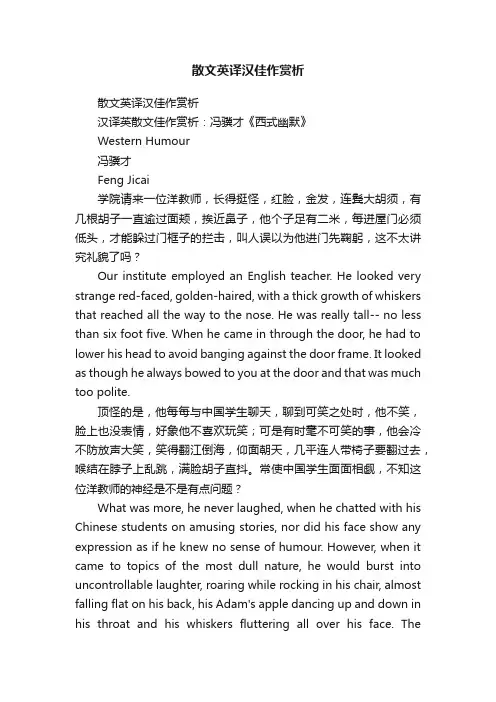
散文英译汉佳作赏析散文英译汉佳作赏析汉译英散文佳作赏析:冯骥才《西式幽默》Western Humour冯骥才Feng Jicai学院请来一位洋教师,长得挺怪,红脸,金发,连鬓大胡须,有几根胡子一直逾过面颊,挨近鼻子,他个子足有二米,每迸屋门必须低头,才能躲过门框子的拦击,叫人误以为他进门先鞠躬,这不太讲究礼貌了吗?Our institute employed an English teacher. He looked very strange red-faced, golden-haired, with a thick growth of whiskers that reached all the way to the nose. He was really tall-- no less than six foot five. When he came in through the door, he had to lower his head to avoid banging against the door frame. It looked as though he always bowed to you at the door and that was much too polite.顶怪的是,他每每与中国学生聊天,聊到可笑之处时,他不笑,脸上也没表情,好象他不喜欢玩笑;可是有时毫不可笑的事,他会冷不防放声大笑,笑得翻江倒海,仰面朝天,几平连人带椅子要翻过去,喉结在脖子上乱跳,满脸胡子直抖。
常使中国学生面面相觑,不知这位洋教师的神经是不是有点问题?What was more, he never laughed, when he chatted with his Chinese students on amusing stories, nor did his face show any expression as if he knew no sense of humour. However, when it came to topics of the most dull nature, he would burst into uncontrollable laughter, roaring while rocking in his chair, almost falling flat on his back, his Adam's apple dancing up and down in his throat and his whiskers fluttering all over his face. Thestudents would then look at each other, wondering if he was in his right mind.一天,洋教师出题,考察学生们用洋文作文的水准,题目极简单,随便议论议论校园内的一事一物,褒贬皆可。
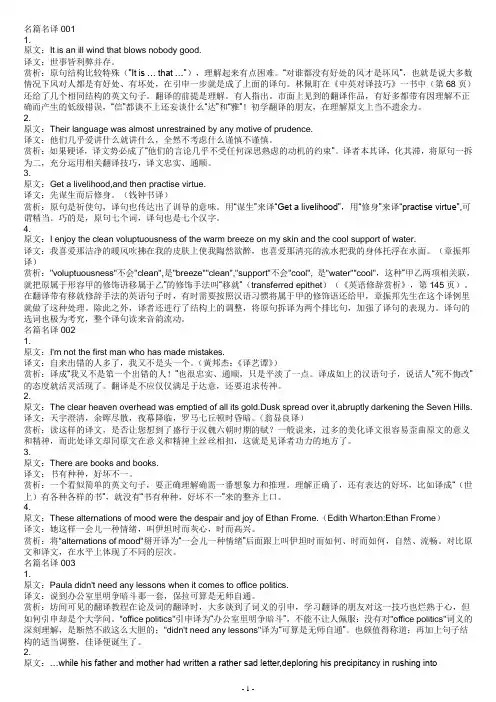
名篇名译0011.原文:It is an ill wind that blows nobody good.译文:世事皆利弊并存。
赏析:原句结构比较特殊("It is … that …"),理解起来有点困难。
“对谁都没有好处的风才是坏风”,也就是说大多数情况下风对人都是有好处、有坏处,在引申一步就是成了上面的译句。
林佩耵在《中英对译技巧》一书中(第68页)还给了几个相同结构的英文句子。
翻译的前提是理解。
有人指出。
市面上见到的翻译作品,有好多都带有因理解不正确而产生的低级错误,“信”都谈不上还妄谈什么“达”和“雅”!初学翻译的朋友,在理解原文上当不遗余力。
2.原文:Their language was almost unrestrained by any motive of prudence.译文:他们几乎爱讲什么就讲什么,全然不考虑什么谨慎不谨慎。
赏析:如果硬译,译文势必成了“他们的言论几乎不受任何深思熟虑的动机的约束”。
译者本其译,化其滞,将原句一拆为二,充分运用相关翻译技巧,译文忠实、通顺。
3.原文:Get a livelihood,and then practise virtue.译文:先谋生而后修身。
(钱钟书译)赏析:原句是祈使句,译句也传达出了训导的意味。
用“谋生”来译“Get a livelihood",用“修身”来译“practise virtue",可谓精当。
巧的是,原句七个词,译句也是七个汉字。
4.原文:I enjoy the clean voluptuousness of the warm breeze on my skin and the cool support of water.译文:我喜爱那洁净的暖风吹拂在我的皮肤上使我陶然欲醉,也喜爱那清亮的流水把我的身体托浮在水面。
(章振邦译)赏析:"voluptuousness"不会"clean",是"breeze""clean","support"不会"cool", 是"water""cool",这种“甲乙两项相关联,就把原属于形容甲的修饰语移属于乙”的修饰手法叫“移就”(transferred epithet)(《英语修辞赏析》,第145页)。
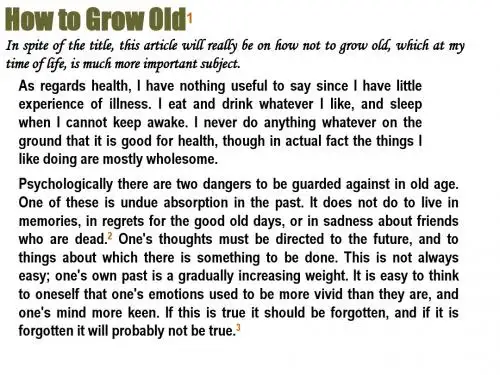
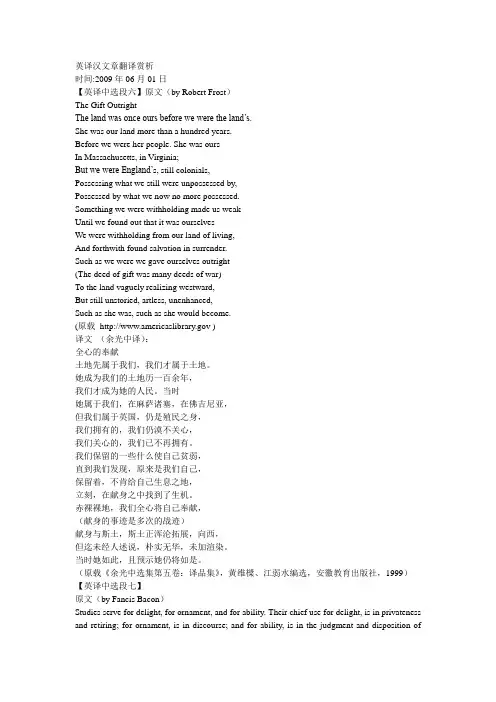
英译汉文章翻译赏析时间:2009年06月01日【英译中选段六】原文(by Robert Frost)The Gift OutrightThe land was once ours before we were the land’s.She was our land more than a hundred years.Before we were her people. She was oursIn Massachusetts, in Virginia;But we were England’s, still colonials,Possessing what we still were unpossessed by,Possessed by what we now no more possessed.Something we were withholding made us weakUntil we found out that it was ourselvesWe were withholding from our land of living,And forthwith found salvation in surrender.Such as we were we gave ourselves outright(The deed of gift was many deeds of war)To the land vaguely realizing westward,But still unstoried, artless, unenhanced,Such as she was, such as she would become.(原载 )译文(余光中译):全心的奉献土地先属于我们,我们才属于土地。
她成为我们的土地历一百余年,我们才成为她的人民。
当时她属于我们,在麻萨诸塞,在佛吉尼亚,但我们属于英国,仍是殖民之身,我们拥有的,我们仍漠不关心,我们关心的,我们已不再拥有。
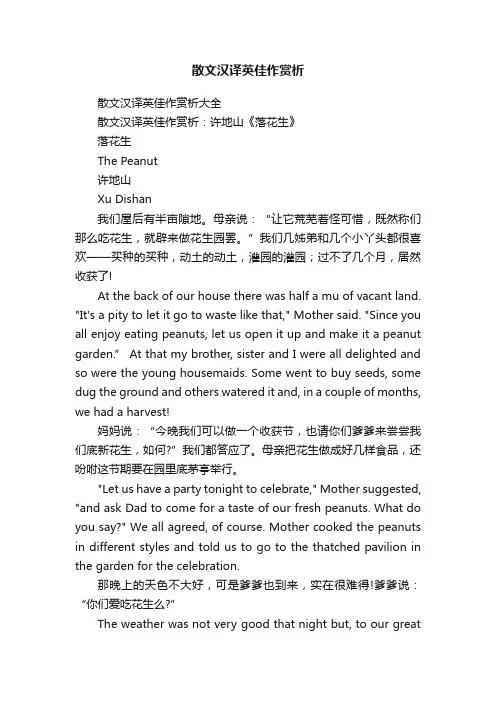
散文汉译英佳作赏析散文汉译英佳作赏析大全散文汉译英佳作赏析:许地山《落花生》落花生The Peanut许地山Xu Dishan我们屋后有半亩隙地。
母亲说:“让它荒芜着怪可惜,既然称们那么吃花生,就辟来做花生园罢。
”我们几姊弟和几个小丫头都很喜欢——买种的买种,动土的动土,灌园的灌园;过不了几个月,居然收获了!At the back of our house there was half a mu of vacant land. "It's a pity to let it go to waste like that," Mother said. "Since you all enjoy eating peanuts, let us open it up and make it a peanut garden.” At that my brother, sister and I were all delighted and so were the young housemaids. Some went to buy seeds, some dug the ground and others watered it and, in a couple of months, we had a harvest!妈妈说:“今晚我们可以做一个收获节,也请你们爹爹来尝尝我们底新花生,如何?”我们都答应了。
母亲把花生做成好几样食品,还吩咐这节期要在园里底茅亭举行。
"Let us have a party tonight to celebrate," Mother suggested, "and ask Dad to come for a taste of our fresh peanuts. What do you say?" We all agreed, of course. Mother cooked the peanuts in different styles and told us to go to the thatched pavilion in the garden for the celebration.那晚上的天色不大好,可是爹爹也到来,实在很难得!爹爹说:“你们爱吃花生么?”The weather was not very good that night but, to our greatdelight, Dad came all the same. "Do you like peanuts?" Dad asked.我们都争着答应:“爱!”"Yes!" we all answered eagerly.“谁能把花生底好处说出来?”"But who ran tell me what the peanut is good for?"姊姊说:“花生的气味很美。
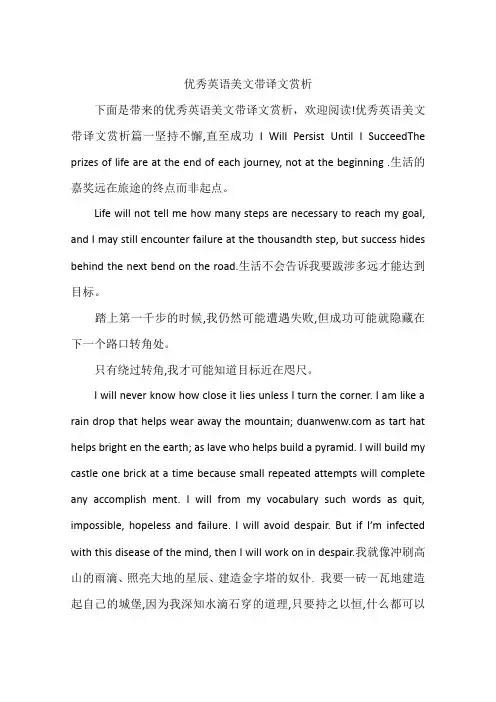
优秀英语美文带译文赏析下面是带来的优秀英语美文带译文赏析,欢迎阅读!优秀英语美文带译文赏析篇一坚持不懈,直至成功I Will Persist Until I SucceedThe prizes of life are at the end of each journey, not at the beginning .生活的嘉奖远在旅途的终点而非起点。
Life will not tell me how many steps are necessary to reach my goal, and I may still encounter failure at the thousandth step, but success hides behind the next bend on the road.生活不会告诉我要跋涉多远才能达到目标。
踏上第一千步的时候,我仍然可能遭遇失败,但成功可能就隐藏在下一个路口转角处。
只有绕过转角,我才可能知道目标近在咫尺。
I will never know how close it lies unless I turn the corner. I am like a rain drop that helps wear away the mountain; as tart hat helps bright en the earth; as lave who helps build a pyramid. I will build my castle one brick at a time because small repeated attempts will complete any accomplish ment. I will from my vocabulary such words as quit, impossible, hopeless and failure. I will avoid despair. But if I’m infected with this disease of the mind, then I will work on in despair.我就像冲刷高山的雨滴、照亮大地的星辰、建造金字塔的奴仆. 我要一砖一瓦地建造起自己的城堡,因为我深知水滴石穿的道理,只要持之以恒,什么都可以做到。
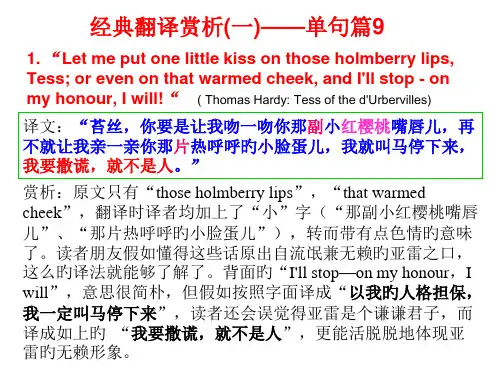
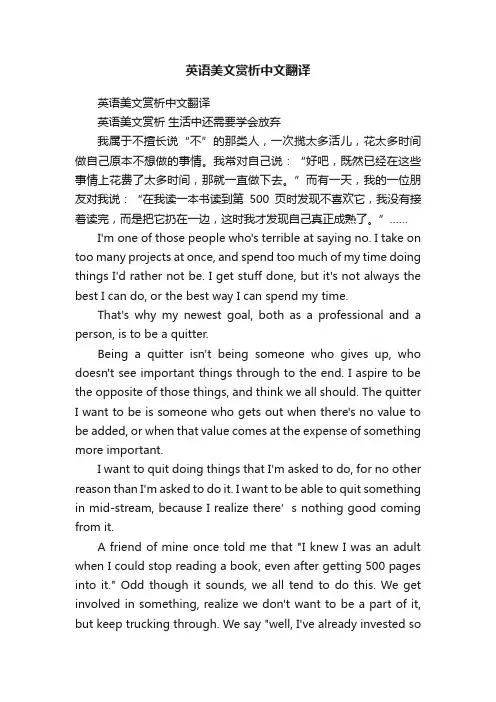
英语美文赏析中文翻译英语美文赏析中文翻译英语美文赏析生活中还需要学会放弃我属于不擅长说“不”的那类人,一次揽太多活儿,花太多时间做自己原本不想做的事情。
我常对自己说:“好吧,既然已经在这些事情上花费了太多时间,那就一直做下去。
”而有一天,我的一位朋友对我说:“在我读一本书读到第500页时发现不喜欢它,我没有接着读完,而是把它扔在一边,这时我才发现自己真正成熟了。
”……I'm one of those people who's terrible at saying no. I take on too many projects at once, and spend too much of my time doing things I'd rather not be. I get stuff done, but it's not always the best I can do, or the best way I can spend my time.That's why my newest goal, both as a professional and a person, is to be a quitter.Being a quitter isn't being someone who gives up, who doesn't see important things through to the end. I aspire to be the opposite of those things, and think we all should. The quitter I want to be is someone who gets out when there's no value to be added, or when that value comes at the expense of something more important.I want to quit doing things that I'm asked to do, for no other reason than I'm asked to do it. I want to be able to quit something in mid-stream, because I realize there’s nothing good coming from it.A friend of mine once told me that "I knew I was an adult when I could stop reading a book, even after getting 500 pages into it." Odd though it sounds, we all tend to do this. We get involved in something, realize we don't want to be a part of it, but keep trucking through. We say "well, I've already invested somuch time in this, I might as well stick it out."I propose the opposite: quit as often as possible, regardless of project status or time invested. If you're reading a book, and don't like it, stop reading. Cut your losses, realize that the smartest thing to do is stop before your losses grow even more, and quit. If you're working on a project at work that isn't going anywhere, but you've already invested tons of time on it, quit. Take the time gained by quitting the pointless project, and put it toward something of value. Instead of reading an entire book you hate, read 1/2 a bad one and 1/2 a good one. Isn't that a better use of your time?If you're stuck doing something, and don't really want to do it anymore, step back for a second. Ask if you really have to do this, and what value is being produced from your doing it. Don't think about the time you've put into it, or how much it's taken over your life. If you don't want to do it, and don't have to do it, don't do it.By quitting these things, you'll free up time to do things that actually do create value, for yourself and for others. You'll have time to read all the great books out there, or at least a couple more. You’ll be able to begin to put your time and effort into the things you'd actually like to do.Let's try it together: what are the things you're doing, that you're only doing because you've been doing them for so long? Quit. Don't let time spent dictate time you will spend. Let's learn how to say "no" at the beginning, or in the middle, and free up more of our time to do the things we’d like to be doing, and the things actually worth doing.Saying no is hard, and admitting a mistaken yes is even harder. But if we do both, we'll start to make sure that we'respending our time creating value, rather than aggravating our losses. Let's be quitters together.What do you think? What in your life can you quit?美文欣赏:你可以选择自己想过的生活Occasionally, life can be undeniably, impossibly difficult. We are faced with challenges and events that can seem overwhelming, life-destroying to the point where it may be hard to decide whether to keep going. But you always have a choice. Jessica Heslop shares her powerful, inspiring journey from the worst times in her life to the new life she has created for herself: 生活有时候困难得难以置信,但又不容置疑。
一、来自你身体的一封信Hi! It's your body here!Allow me to reintroduce myself.嗨,我是你的身体!允许我再自我介绍一下。
I'm the home that you've always lived in. Surely you remember.We grew up together!我是你一直住着的“家”。
你肯定记得我,我们一起长大的。
And I'm writing in this letter cause,I feel neglected in this relationship,very disappointed in what I've been seeing. 我写这封信是因为,我感觉我在这段关系里被忽视了。
我对我所看到的很失望。
With your ambition to make moneyyou sacrificed my well being,which makes no sense in the leastbecause when I get sickyou sacrificed that same moneyto recuperate ME.你有想挣钱的雄心,却为此牺牲我的健康。
这完全不合理,因为如果我病了,你赚的那些钱都要用来给我治病!And what's even more ironicis with all your interest in profityou can't even see the truththat I'm worth over A BILLION DOLLARS. 更讽刺的是,你利欲熏心,甚至看不清这个事实:我才是最宝贵的啊!Don't believe me?Okay I'll prove it.你不相信?好吧,我证明给你看。
英语美文及中文翻译赏析精选英语美文及中文翻译赏析I will persist until I succeed.坚持不懈,直到成功。
In the Orient young bulls are tested for the fight arena in a certain manner. Each is brought to the ring and allowed to attack a picador who pricks them with a lance. The bravery of each bull is then rated with care according to the number of times he demonstrates his willingness to charge in spite of the sting of the blade. Henceforth will I recognize that each day I am tested by life in like manner. If I persist, if I continue to try, if I continue to charge forward, I will succeed.在古老的东方,挑选小公牛列竞技场格斗有一定的程序、它们被带进场地,向手持长矛的斗牛士攻击,裁判以它受激后再向斗牛士进攻的次数多寡来评定这只公牛的勇敢程度。
从今往后。
我须承认,我的生命每天都在接受类似的考验。
如果我坚韧不拔,勇往直前,迎接挑战。
那么我一定会成功。
I will persist until I succeed.坚持不懈。
直到成功。
I was not delivered unto this world in defeat, nor does failure course in my veins. I am not a sheep waiting to be prodded by my shepherd. I am a lion and I refuse to talk, to walk, to sleep with the sheep. I will hear not those who weep and complain, for their disease is contagious. Let them join the sheep. The slaughterhouse of failure is not my destiny.我不是为了失败才来到这个世界上的,我的血管里也没有失败的血液在流动。
中英互译的英语美文赏析英语阅读是初中学生学习英语的主要途径。
因此,学生英语阅读理解能力的培养就显得尤为重要。
下面是店铺带来的中英互译的英语美文赏析,欢迎阅读!中英互译的英语美文赏析篇一“孺子马”An "Obedient Horse"宋连昌Song Lianchang我的邻居老纪,是位消息灵通人士。
每天下班,总要带回几条新闻:大至国内外大事,小到谁家夫妻吵架、婆媳不和……他发布新闻,是大家都在做饭的时候,地点自然以厨房居多。
My neighbor Lao Ji was well informed. Every day when he got off work, he would bring several pieces of news from big events at home and abroad down to Small strifes between husband and wife, or between mother-in-law and daughter-in-law. The tune far his news broadcast was usually dinner time, so the best place for it was naturally the shared kitchen.这天,老纪进了厨房就说:“老王,你听说了吗?”“什么事?”“ XXX的儿子被逮了。
”“噢!因为什么?”我停住手里的菜刀,惊愕地问。
“还用说,犯法了呗!……”One day, Lao Ji carte into the kitchen and said, "Lao Wang, haven't you heard the news?" "What?" "So-and-so's son has been arrested." "Oh? Why?" I asked in surprise, putting down the knife. "No doubt for an offense against the law.“其实,那孩子小时候也蛮好,都是家长的过失。
1. Lexicography1)Lexicography provides at its best a joyful sense of busyness with language词典编纂的绝妙之处是给人一种与语言打交道的快乐感。
2) One is immersed in the details of language as in no other field.不像其他领域,编词典的人整天都钻在语言材料中。
3) Sometimes the details are so overwhelming and endless they sap the spirit and depress the mind有时碰到的语言材料浩如烟海,令人耗神。
4) Often at the end of a hard day’s work one realizes with dismay that the meager stack of finished work one has accomplished has an immeasurably slight impact on the work as a whole往往一天辛苦工作下来,发觉所完成的薄薄几页草稿只是全部工作的九牛一毛,好不沮丧。
5) As I hope the readers of this work will come to understand dictionaries do not sprint into being正如我希望这部著作的读者会逐渐明白的那样,词典并非是一蹴而就的。
6)People must plan them collect information and write them. 必须先制定计划,收集材料,然后方能编写。
7 )Writing takes time and it is often frustrating and even infuriating.编写词典不仅耗费时间,而且常让人受挫,甚至恼怒。
英译汉文章翻译赏析时间:2009年06月01日【英译中选段六】原文(by Robert Frost)The Gift OutrightThe land was once ours before we were the land’s.She was our land more than a hundred years.Before we were her people. She was oursIn Massachusetts, in Virginia;But we were England’s, still colonials,Possessing what we still were unpossessed by,Possessed by what we now no more possessed.Something we were withholding made us weakUntil we found out that it was ourselvesWe were withholding from our land of living,And forthwith found salvation in surrender.Such as we were we gave ourselves outright(The deed of gift was many deeds of war)To the land vaguely realizing westward,But still unstoried, artless, unenhanced,Such as she was, such as she would become.(原载 )译文(余光中译):全心的奉献土地先属于我们,我们才属于土地。
她成为我们的土地历一百余年,我们才成为她的人民。
当时她属于我们,在麻萨诸塞,在佛吉尼亚,但我们属于英国,仍是殖民之身,我们拥有的,我们仍漠不关心,我们关心的,我们已不再拥有。
我们保留的一些什么使自己贫弱,直到我们发现,原来是我们自己,保留着,不肯给自己生息之地,立刻,在献身之中找到了生机。
赤裸裸地,我们全心将自己奉献,(献身的事迹是多次的战迹)献身与斯土,斯土正浑沦拓展,向西,但迄未经人述说,朴实无华,未加渲染。
当时她如此,且预示她仍将如是。
(原载《余光中选集第五卷:译品集》,黄维樑、江弱水编选,安徽教育出版社,1999)【英译中选段七】原文(by Fancis Bacon)Studies serve for delight, for ornament, and for ability. Their chief use for delight, is in privateness and retiring; for ornament, is in discourse; and for ability, is in the judgment and disposition ofbusiness. For expert men can execute, and perhaps judge of particulars, one by one; but the general counsels, and the plots and marshalling of affairs, come best from those that are learned. To spend too much time in studies is sloth; to use them too much for ornament, is affectation; to make judgment wholly by their rules, is the humour of a scholar.译文(王佐良译):读书足以怡情,足以傅彩,足以长才。
其怡情也,最见于独处幽居之时;其傅彩也,最见于高谈阔论之中;其长才也,最见于处世判事之际。
练达之士虽能分别处理细事或一一判别枝节,然纵观统筹、全局策划,则舍好学深思者莫属。
读书费时过多易惰,文采藻饰太盛则矫,全凭条文断事乃学究故态。
(原文译文皆原载《翻译:思考与试笔》,王佐良,外语教学与研究出版社,1989)【英译中选段一】原文:Happily lived Mankind in the peaceful Valley of Ignorance.To the north, to the south, to the west and to the east stretched the ridges of the Hills Everlasting.A little stream of Knowledge trickled slowly through a deep worn gully.It came out of the Mountain of the Past.It lost itself in the Marshes of the Future.It was not much, as rivers go. But it was enough for the humble needs of the villagers.In the evening, when they had watered their cattle and had filled their casks, they were content to sit down to enjoy life.The Old Men Who Knew were brought forth from the shady corners where they had spent their day, pondering over the mysterious pages of an old book.They mumbled strange words to their grandchildren, who would have preferred to play with the pretty pebbles, brought down from distant lands.译文:在宁静的无知之谷中,人类快乐地生活着。
永恒之山向四面八方延伸。
一条知识小溪从深壑幽谷中缓缓流过。
它从往昔的山脉中流来。
它消失在未来的沼泽中。
溪水不大,不及河水滚滚,但它足以应付村民们那微薄的需求了。
晚上,当他们饮罢牲口、灌满水桶之后,就坐下来心满意足地享受生活。
见多识广的老人们从阴冷的角落里出来了。
整个白天他们都呆在那里,对着一本古书上的神秘文字沉思。
他们嘴里嘟哝着奇怪的话语,对着孙儿们喋喋不休。
而孙儿们更愿意把玩那些从遥远的异乡带回的美丽小石子。
【英译中选段二】原文:(by Francis Bret Hart)But the faith of the majority proved to be securely based. Bill had scarcely ceased growling before we heard a quick step upon the porch, the trailing of a wet skirt, the door was flung open, and with flash of white teeth, a sparkle of dark eyes, and an utter absence of ceremony of diffidence, ayoung woman entered, shut the door, and, panting, leaned back against it.“Oh, if you please, I’m Miggles!”And this was Miggles! This bright-eyed, full-throated young woman, whose wet gown of coarse blue stuff could not hide the beauty of the feminine curves to which it clung; from the chestnut crown of whose head, topped by a man’s oilskin sou’wester, to the little feet and ankles, hidden somewhere in the recesses of her boy’s brogans, all was grace—this was Miggles, laughing at us, too, in the most airy, frank, offhand manner imaginable.(节选自Miggles, Francis Bret Hart, Overland Monthly, Jun. 1869)译文:(胡适译)但我们多数人的意见是不错的。
余八的气话还没有说完,我们就听见了门口有很快点脚步声响,还夹着湿裙子拖在门阶上的声音。
门开了,一个年轻女子走进来—雪白的牙齿,晶莹的眼睛,绝无拘束又绝无狐疑的神气—她随手关上门,喘着气,靠在门上,开口说:“哦,对不住,我是米格儿!”原来这是米格儿—这个晶莹妙目,响亮喉咙的少年女人,她的蓝粗布的湿衣服遮不住她身上的曲线美,从她头顶上漆皮男雨帽罩着的栗色头发,到她脚下男式粗靴遮着的脚和踝骨,样样都是优美的风标—这是米格儿。
(原载《短篇小说集》,胡适,上海亚东图书馆,1993)【英译中选段三】原文:(by Robert Browning)You’ll Love Me YetRobert BrowningYou’ll love me yet! – and I can tarryYour love’s protracted growing;June rear’d that bunch of flowers you carryFr om seeds of April’s sowing.I plant a heartful now: some seedAt least is sure to strike,And yield—what you’ll not pluck indeed,Not love, but, may be, like.You’ll look at least on love’s remains,A grave’s one violet:Your look? – that pays a thousand pains.What’s death? You’ll love me yet!(原载Pippa Passes, the Poetical Works of Robert Browning :Bells and Pomegranates, Ian Jack, Oxford University Press, 1991)译文:(胡适译)你总有爱我的一天罗伯特·勃朗宁你总有爱我的一天!我能等着你的爱慢慢长大。